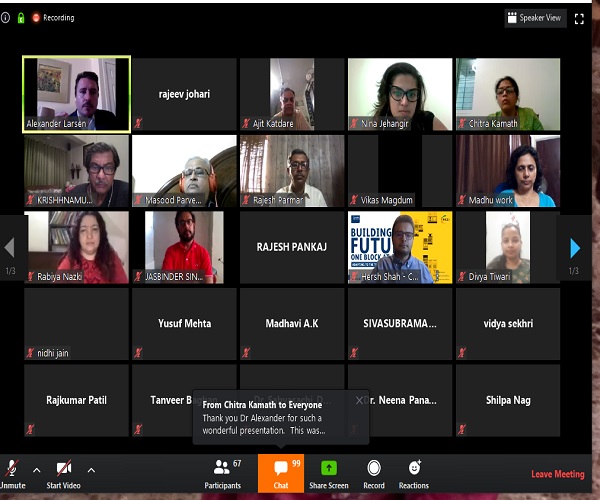
- itsmn@its.edu.in | 18003095855 | 8447744044 |

Latest Updates
Dr. Rajeev Johari attended the highly informative webinar organized jointly by FICCI and The Institute of Risk Management

UK - India Affiliate World's Leading Body for Enterprise Risk Management [Level 1 - Level 5] on the 13th of April’2020 with Mr. Alexander Larsan as the key speaker.
Mr. Larsan introduced with the UNESCO report according to which the pandemic is expected to adversely impact 290 million students across 20 countries. Risk management as stated by him seeks to prevent risks from occurring as well as reducing the impact if it does occur and that insurance is an example of reducing impact. In this regard business continuity is another example and a more effective one. Focusing on pandemic planning he elaborated the concept of business continuity. Business continuity management as emphasized by him is a holistic management process that identifies potential threats to an organization and the impacts to business operations that those threats, if realized might cause and which provides a framework for building organizational resilience with the capability for an effective response that safeguards the interests of its key stakeholders, reputation, brand and value creating activities. Business continuity is neither emergency response planning nor is disaster recovery. Business continuity plans can help reduce the impact of multiple risks.
Elaborating on the tenfold pandemic plan for businesses he threw light of top concerns of universities and risks involved like fall in student numbers, fall in rankings and financial viability. The risks include change in government grants/ loans policy or funding plans, inability to host exams timely, cyber attacks etc. As for effect of uncertainty on objectives of organizations he mentioned that the purpose of risk management is to manage the barriers and maximizing the opportunities to achieving these objectives.
He highlighted the importance of understanding risks which help us to understand constraints and boundaries. Towards this he stated “Embrace them. Let them guide you. Constraints drive innovation and force focus. Instead of trying to remove them, use them to your advantage”.
He further emphasized upon preparing for a post covid world which has opened current opportunities for universities like remote learning, integration of technology such as virtual learning and augmented reality, digital certificates applying technologies like block chain, split class rooms, supply chain within country to name a few. Alternative business models in case of class closures are highly relevant here like catering services, film production company, labs to include virus testing equipment, science schools to develop ability to create hand sanitizers, textile schools to include masks.
He stressed upon the failure situations pertaining to risk management. It fails when the process is overcomplicated, time consuming, too much dependent on paper work and extra concerned about details. It thus needs to be kept simple. He illuminated the steps involved in developing a risk management approach.
The risks involved in going digital according to him include unstable internet connections, lack of connectivity, lack of interactivity in courses, attention lack on the part of students, failure of platform, loss of data hijacks etc.
A post covid world as per his opinion would entail less travel, continued social distancing, less youth employment, more home working, shift in economic structure, adoption of robotics/ AI, regulation of supply chain. Organizations would require to look at how to diversify, reinvent and transform, the crux being the need to manage and take risk in order to survive and thrive. This is vital since in the absence of risk information one lacks the full perspective to make an effective decision, understand the pitfalls and prepare for them, properly compare options and turn risks into opportunity.
Improved reporting and information for decision makers is required towards managing the current crisis that would cover key risk indicator data for early warning signs. Risk management provides up to date information regarding vulnerabilities across the organizationand key focus areas. Identifying emerging risks or horizon scanning is crucial here that includes identifying trends in relation to education sector, country, region and global level as well as technology trends.
The concept of risk needs to be differentiated from the concept of emerging risk and black swan. Risk which is usually a 12 month horizon is more related to day to day business plan. Emerging risk features a long term horizon. Often a new technology or global change that can be difficult to tell how it will impact the organization, but that will need to be dealt with ahead of time to prepare for the change to come often calling for a change in strategy is emerging risk. Black swan could occur any time with very low likelihood but huge impact which is often unforeseen.
He winded up the discussion citing some successful business continuity examples from Scotland and middle east. The talk was fully loaded with new information relevant to the present state of lull in event of the world wide covid-19 pandemic.